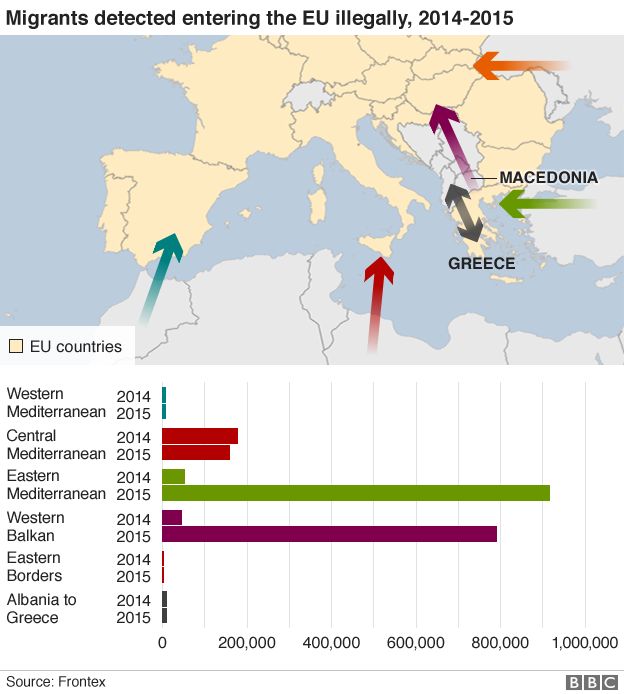There is a lot of Hillary and Bill history as previously posted here. but the video above just keeps it real and recent.
Category Archives: Presidential campaign
The Breakdown Prediction of Europe
Fighting wars in the Middle East with politically correct rules of engagement leads to no victory, but rather a long agonizing conflicts where millions are displaced, governments are failing and human suffering has no limitations.
The migrant condition is predicted to continue for at least five years. Europe is slated to suffer economically as a result and respective countries will lose their identity and management control.
These conditions fester yet do not include the building hostilities in Eastern Europe which is facing an insurgency by Russia where real old fashioned ground wars are forecasted. After 16 years of fighting the terrorist model of conflicts the conventional type of warfare is forgotten in training and muscle memory and could be a real conundrum for the Baltic region.
Meanwhile, what is Europe’s long term plan? Answer, there is no plan. ****
Europe migrant crisis: EU faces ‘populist uprising’

Reuters: Europe has seen a surge in the number of migrants trying to reach the continent
BBC: Europe faces a “populist uprising” if it is unable to show people it can control the migrant crisis, former MI6 head Sir Richard Dearlove has said.
He was speaking on the BBC’s World on the Move day on migration issues.
Sir Richard also warned against offering visa-free travel to Turkish nationals, describing the move as like storing gasoline near a fire.Earlier, UN special envoy Angelina Jolie Pitt warned the humanitarian system for refugees was breaking down.
She spoke of a “fear of migration” and a “race to the bottom” as countries competed to be the toughest to protect themselves.
A range of speakers, including the UNHCR’s special envoy Angelina Jolie Pitt, and former British secret intelligence chief Sir Richard Dearlove, have been setting out the most important new ideas shaping our thinking on economic development, security and humanitarian assistance.
Sir Richard said the numbers of immigrants coming into Europe over the next five years could run into millions.
The crisis could reshape the continent’s geopolitical landscape, he said.
“If Europe cannot act together to persuade a significant majority of its citizens that it can gain control of its migratory crisis then the EU will find itself at the mercy of a populist uprising, which is already stirring,” he added.
He described the UK referendum on leaving the EU as “the first roll of the dice in a bigger geopolitical game”.
Reuters: There are concerns that Europe is unable to control the flow of migrants
Sir Richard warned against a deal with Turkey to allow visa-free travel to the EU to its citizens in exchange for controlling migration to the EU.
He said it was “perverse, like storing gasoline next to the fire we’re trying to extinguish”.
Talks between the Turkey and the EU over the deal have currently stalled over the former’s refusal to amend its anti-terror laws.
The former head of MI6, which gathers intelligence abroad for the UK government, said €1.8bn (£1.4bn) allocated by the EU to address the root causes of migration in Africa made “much more sense” than a deal with Turkey but was not nearly enough.
The only answer was a “massive response” of this kind combined with a “much more aggressive operation along the North African coast”, he added.
But Sir Richard cautioned against shutting the door on migration altogether.
“In the real world there are no miraculous James Bond-style solutions,” he said. “Human tides are irresistible unless the gravitational pull that causes them is removed.”
Speaking earlier in the day, Ms Jolie Pitt said that more than 60 million people – one in 122 – were displaced globally – more than at any time in the past 70 years.
“This tells us something deeply worrying about the peace and security of the world,” she said, adding: “The average time a person will be displaced is now nearly 20 years.”
Ms Jolie Pitt said the “number of conflicts and scale of displacement had grown so large” the system to protect and return refugees was not working.
Save the Children is calling for greater international commitment to ensure child refugees remain in school.
The charity’s new report, A New Deal for Refugees, says only one in four refugee children is now enrolled in secondary school.
It is calling on governments and aid agencies to adopt a new policy framework that will ensure no refugee child remains out of school for more than a month.
It is an ambitious target but there is growing concern that this migration crisis is producing a lost generation of children which means conditions for even greater insecurity and poverty.
A note on terminology: The BBC uses the term migrant to refer to all people on the move who have yet to complete the legal process of claiming asylum. This group includes people fleeing war-torn countries such as Syria, who are likely to be granted refugee status, as well as people who are seeking jobs and better lives, who governments are likely to rule are economic migrants.
$$ Taken Out of Veteran’s Pockets for Visa Program
But we are still in Afghanistan and will be there for many years…where is the United Nations? What role does the refugee resettlement program have in this so as not to penalize veterans?
The Senate Grew A Special Visa Program With Money Taken Out Of Veterans’ Pockets
***** Meanwhile Afghanistan is hardly stable or a conflict where victory is claimed.
17 May 2016 – The United Nations humanitarian wing has reported that since the beginning of the year, about 1,000 Afghans have fled their homes every day due to fighting, and aid workers are struggling to meet the needs of those on the run from hard hit provinces such as Kunduz, Herat and Uruzugan.
According to a report compiled in April and newly released by the UN Office for the Coordination of Humanitarian Affairs (OCHA), the main humanitarian story of the year is the very large number of people fleeing from their homes to save their lives, with about 118,000 on the move in the first four months of the year.
Specifically in Kunduz, OCHA said springtime in the north eastern province “has been tragically filled with conflict and suffering,” leading to an extraordinary displacement of more than 22,400 people. Civilians appear to be caught in the cross-fire between a “spring offensive” launched by non-State actors and subsequent countermeasures put in motion by Government forces.
Fleeing for their lives, 14, 000 people were forced from Kunduz city to remote areas where the conflict is most active. The insecure environment and access constraints created severe challenges in the delivery of humanitarian assistance.
As the violence continued after mid-April, families were forced to flee and seek safety with family members and neighbours who opened their doors to offer a haven in the midst of chaos. “When we conducted the initial needs assessments, as many as six families were living in one house,” reported Syed Zaheer, OCHA Humanitarian Affairs Officer, who helped lead the joint assessment mission.
The security situation in Kunduz province continued to rapidly deteriorate, OCHA said. And as displacement swelled, aid agencies prioritized urgent humanitarian assistance to the 7,000 displaced people, however in many cases one of the biggest challenges is access to reaching the most vulnerable families in need.
According to the report, as the battle raged on for territorial control in all seven districts of Kunduz province, families were further displaced to more remote and insecure areas where humanitarian agencies continue to struggle to gain access.
Although physical access to displaced families remains a challenge due to IEDs, military operations and road closures, humanitarian agencies managed to deliver much needed food, nutritional support, emergency shelter, non-food items (NFIs) and health care.
“The displaced families in Kunduz have endured repeated suffering – some displaced two and three times – raising their vulnerability,” explained OCHA Head of Sub-Office, Gift Chatora. “We have seen the detrimental consequences when displaced families are inaccessible to humanitarian assistance, children miss out on education, nutrition and basic health care while parents lose their livelihoods and means to provide for their families.”
Cheat Sheet on the Defense Authorization Bill
Since Congress specifically provided the president with the authority to acquire the U.S. Naval Station at Guantanamo Bay, Chairman Royce’s legislation asserts Congress should have to approve any decision to give it away, which certainly shouldn’t happen with this communist and hostile Cuban government.
As Chairman Royce has said, “the U.S. Naval Station at Guantanamo Bay is critical to our national security and humanitarian operations that have saved countless lives. We must protect against executive overreach during this administration, and the next, and the next.”
DefenseNews/WASHINGTON — Responding to fears the US military’s technological superiority is at risk, the Senate Armed Services Committee advanced an annual defense policy bill that would open competition to commercial industry, seen as a spur to innovation and cost-efficiency.
The marquee change, if the SASC’s version of the 2017 National Defense Authorization Act passes Congress and is signed by the president, is the proposed closure of the Pentagon’s chief weapons buyer’s office and reassignment of its duties to two new defense undersecretaries for innovation and acquisitions management. It also contains far-reaching language to curb a major concern of SASC Chairman John McCain: cost-plus contracts.
In February, McCain made headlines when he vowed not to authorize the Air Force’s Long Range Strike-Bomber so long as it was procured using a cost-plus contract. The SASC bill does not check that box, but it promises a broader impact, to discourage cost-plus contracts, where a contractor is paid for all of its allowed expenses to a set limit, plus additional payment to allow for a profit.
In a background briefing on Monday, a senior committee aide — who likened DoD’s dependence on cost-plus to a drug addiction — said the venerable contracting vehicle has its uses, but too often fuels cost overruns and is out of step with the way commercial firms in Silicon Valley and elsewhere do business. Fixed-price contracts, on the other hand, give firms an incentive to work as efficiently as possible to maximize their profits.
“All of this reform is because the Cold War has ended, and post-Cold War, American technological military dominance is over, and not only can our adversaries see that they can replicate what we can do with the traditional defense marketplace, they are seeing there is a lot of technology in the commercial marketplace,” said the aide. “If they can access that quicker than we can access that and derive defense products from that new base, they can potentially leap ahead of us.”
The bill, which the SASC voted to advance to the full Senate last week, contained 130 acquisition reform provisions — a continuation of the committee’s work last year. Some language aimed at curbing bid protests would mean any large firms that lose a protest they file would have to pay a penalty, while other provisions would curb barriers to entry for so-called non-traditional firms.
Complex, DoD-unique cost-accounting standards geared toward the minutiae of cost-plus contracts have not only created a barrier for commercial firms but an auditing backlog within DoD that is preventing 30- and 40-year-old contracts from being closed, the Senate aide said.
To address this, the bill would set up a new accounting standards board aimed at pro-competition changes.
“We’re looking to move more and more companies away from that [accounting standard], and make sure the way accounting looks in the department is more and more commercial-like, so companies aren’t creating new accounting systems just to deal with the Department of Defense,” the aide said.
For a company like SpaceX, which is developing its own rocket engine, assessing a reasonable price is a tricky proposition, the Senate aide said. For DoD, which uses cost-plus contracting, it’s the agreed-upon cost of production plus a reasonable profit, while for a commercial firm, it’s about what the market will bear.
“In the fixed-price world, your profit margin is about how well you execute,” the aide said. “A government contractor is more like a utility, and the argument is who’s more innovative, someone with a high margin or a public utility?”
A four-year pilot program established by the bill would exact fees to fund advanced prototypes purchased through fixed-price contracts. The penalties would amount to, for a cost-plus technology development contract, an additional 1 percent of DoD’s year-to-year obligation, and on a procurement contract, 2 percent. This requirement would begin in 2018.
Among other measures, the bill would establish a phased-in, internal approval process for cost-plus contracts, which by 2020 would apply to any cost-plus contract over $5 million.
Ultimately, the Defense Department will not be kept from using cost-plus contracts where needed, particularly for defense-unique platforms like, say, a nuclear submarine. However, the aide stopped short of saying the proposed bill, if enacted, would have precluded the current acquisition strategy for the bomber. Instead, the bill reinforces the signal that arrangements of this type will face new scrutiny.
“We would hope the department would look at that in a different manner,” the aide said. “Ultimately it will be discretionary. We don’t want to impinge on the [defense] secretary.”
Bid Protests
Acknowledging the value of the bid protest process as a policing function for defense acquisitions, the aide said it also creates a risk-averse culture among acquisitions officials that is stymying innovation. Hence the proposed “loser pays” provision.
That language would apply to a protest-losing company with more than $100 million in annual revenue, or an incumbent firm that protests the loss of a contract, keeps the business via a bridge contract and then loses. The penalty would equal the Government Accountability Office’s cost to process the protest.
What’s driving the language, the Senate aide said, is that Wall Street analysts have begun to tout protests as being part of the fiduciary responsibility of a losing firm. Members of the committee fear that this thinking, unchecked, will fuel a boom in protests.
Another concern was that the risk aversion among contracting officers was leading to contract awards for lowest-price, technically acceptable, offerings over offerings that were neither the most innovative or the best value for the government.
Table 1. FY2017 National Defense Authorization Act (H.R. 4909)
amounts in millions of dollars of discretionary budget authority
Bill Title Budget Request HASC reported bill (H.R. 4909) Senate committee- reported bill Conference Report National Defense Base Budget Procurement 101,971.6 103,062.3 Research and Development 71,391.8 71,629.8 Operation and Maintenance 171,318.5 169,325.3 Military Personnel 135,269.2 134,849.8 Defense Health Program and Other Authorizations 36,557.0 37,025.6 Military Construction/Family Housing 7,444.1 7,694.0 Subtotal: DOD Base Budget 523,952.1 523,586.9 Atomic Energy Defense Activities 19,240.5 19,512.1 Other Defense-Related Agencies 211.0 300.0 TOTAL: National Defense Budget Function (050) Base Budget 543,403.6 543,399.0 DOD OCO Budget 58,798.0 58,793.5 GRAND TOTAL: FY2017 NDAA 602,201.6 602,192.5




